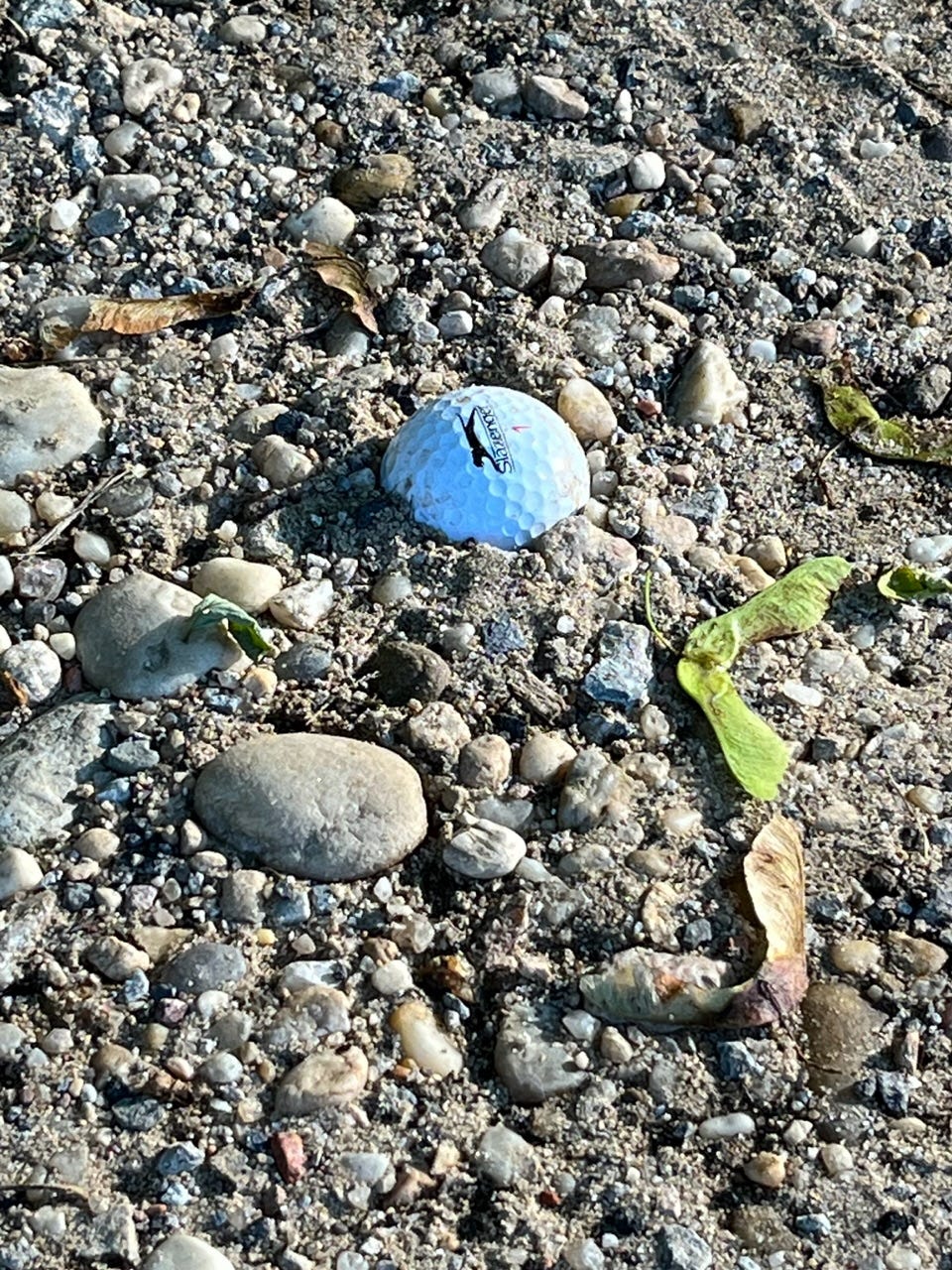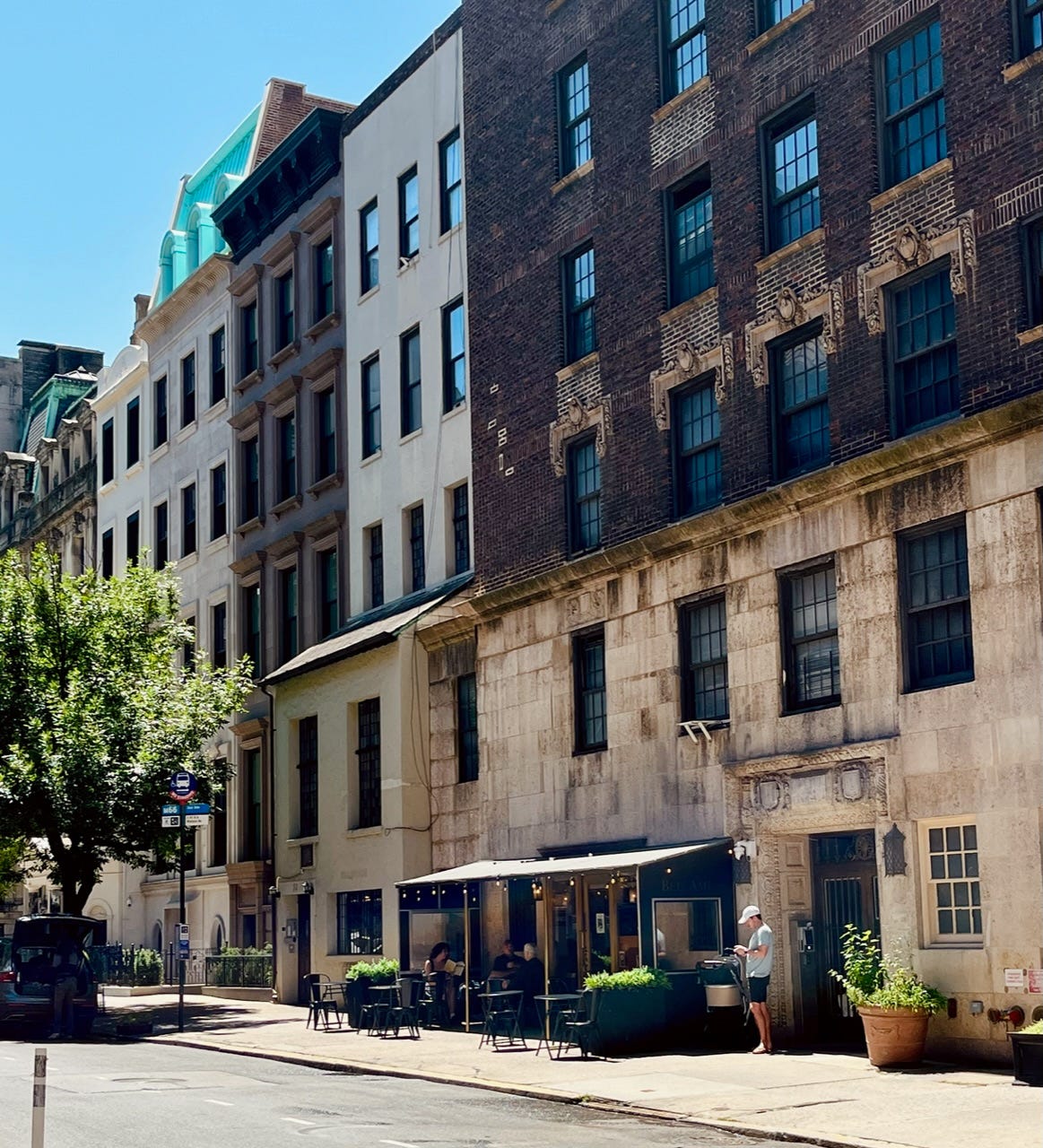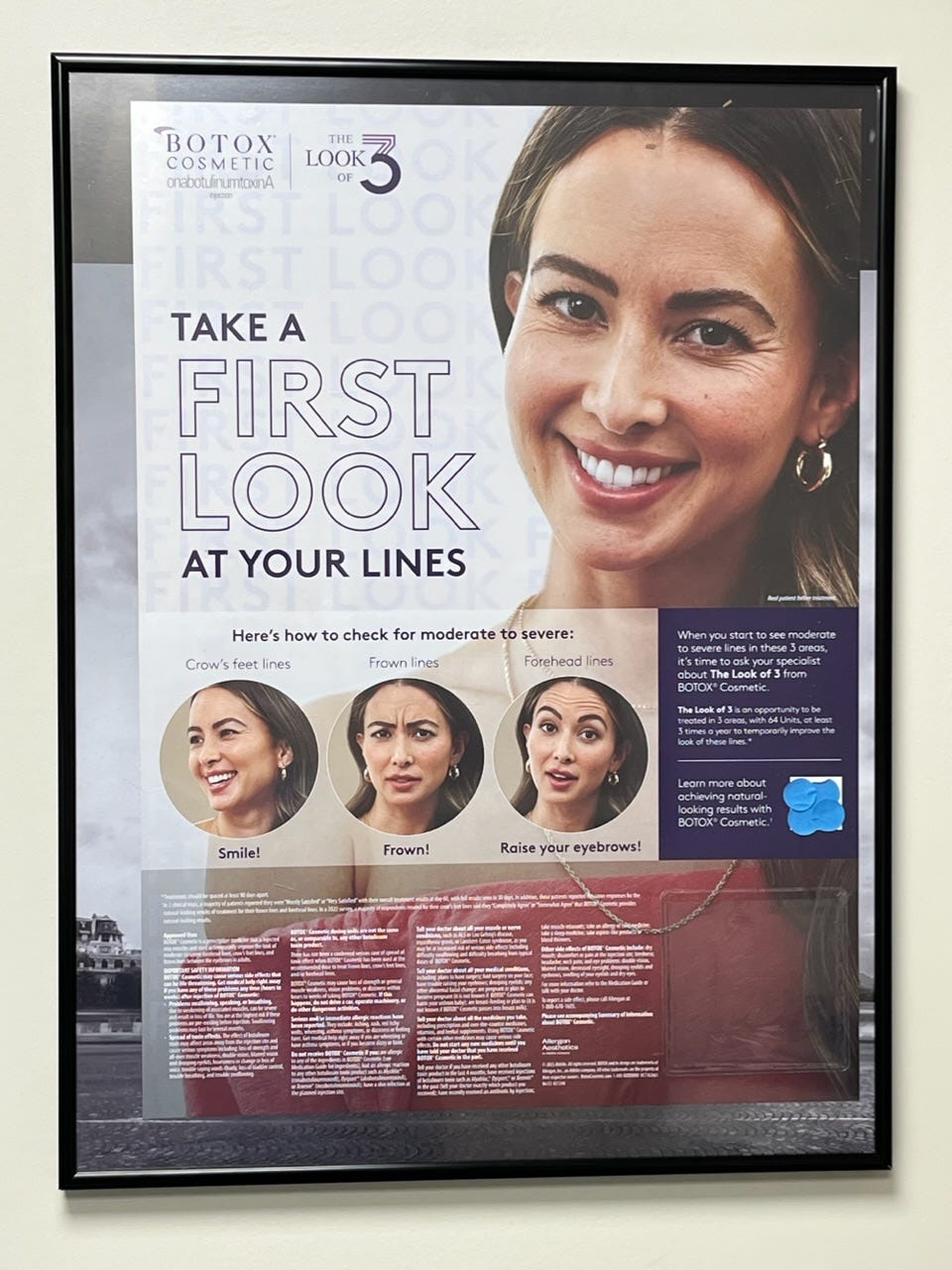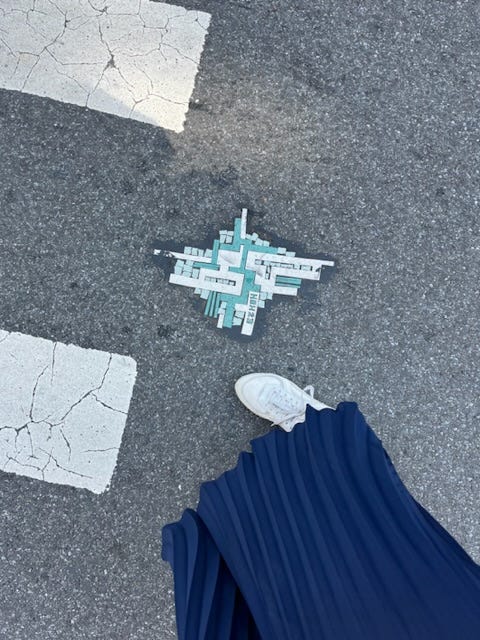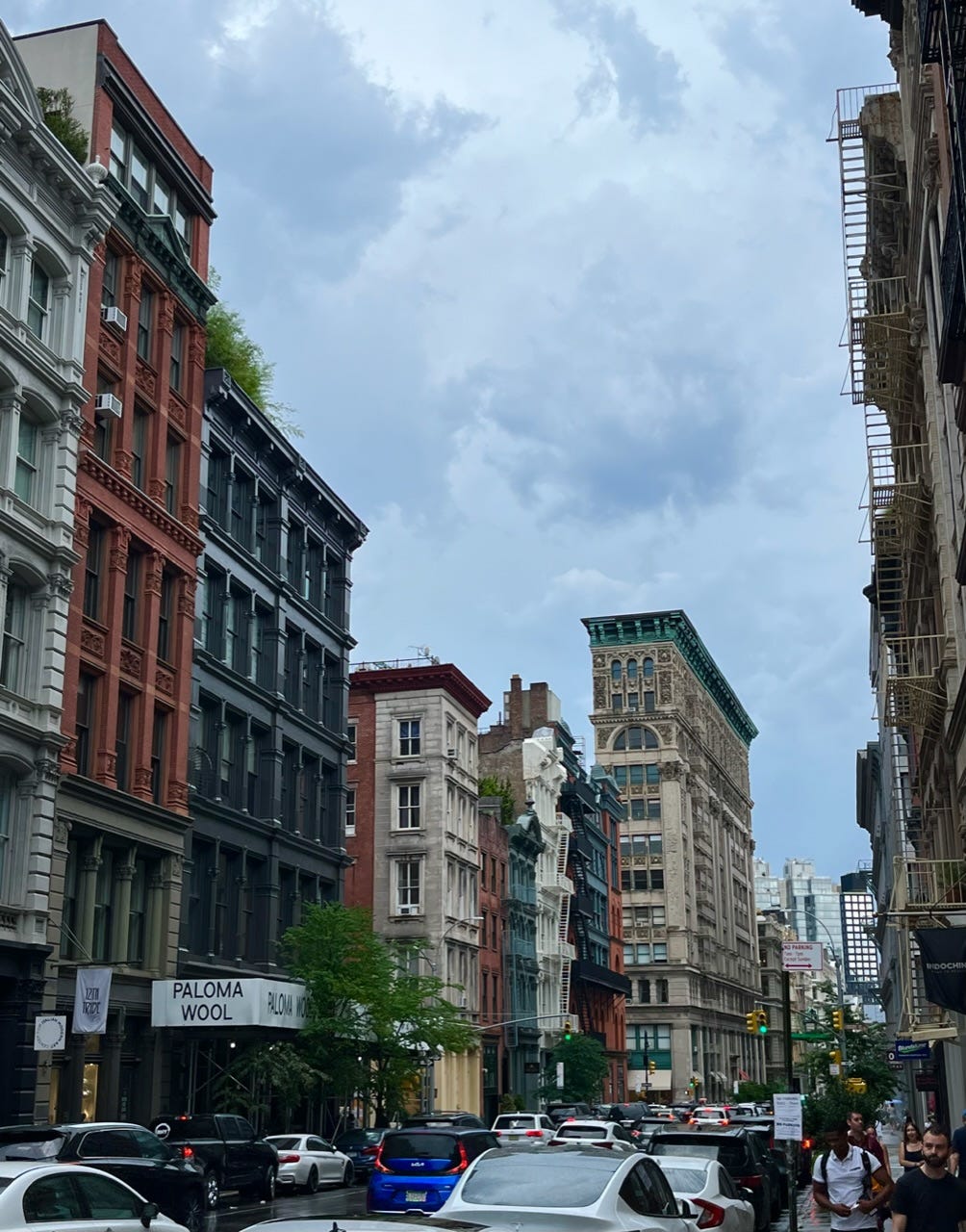$212 for Monthly Rent, Plate-Sized Pastries, and Botox in the Waiting Room
Live drawings of New York resident Joel Singer, and French writer-director Catherine Breillat, as well as the best Fourth of July video I’ve seen this year
Something I didn’t post a few weeks ago, for my “detritus” series (that is: random stuff I see on the ground). This was near my aunt’s and uncle’s on Shelter Island. It got progressively buried as the days went on:
Seen from a cross-Island bus. A world of Coca-Cola:
Midtown on a recent Monday:
Seen and Overheard:
The cafe I wanted to visit during a jaunt on the Upper East Side (which, lest you think is near me, is actually 40 minutes away via subway and walking) — Poppi — is closed.
I find out later that this is lucky, because I have to find another one as a makeshift workplace, and land on Bel Ami, a friendly little gem. The scene looks a little Italian from afar, with that light-colored stone facade around it:
I have to finish up a couple of illustrations for a commission, so I work out on the little veranda. There are two fancy older French men having a grand time about eight feet away.
“C’est mieux, les condos,” one says — “Condos are better.”
Yes, in New York, they are! (Forgive me if I didn’t get the grammar right; still learning French).
The daughter of one of the men stops by with her poodle and joins the pair for a spell. She seems good-natured. She speaks perfect English on her business calls, and perfect (I think) French at the table with them.
A woman next to me offers me one of her napkins when she sees I’m managing to make a mess with my iced coffee. I thank her. She tells me about her adult children, who will all be descending upon her second home in West Hampton tonight for the long weekend with their children. She talks about how, some places out east, it feels like an outdoor mall these days, with all of these big-box stores and brands lining the streets.
“It feels like Fifth Avenue out there sometimes.” She says that East Hampton, especially, has become a zoo, not the backwater it used to be thirty years ago. West Hampton still has a lot of little shops.
Eventually the veranda fills up. There’s only one seat left.
An older man in a natty suit comes out, and the waiter asks the woman at the table with the free chair if she’d mind company.
“I’d mind if you DIDN’T sit down!” the woman (whose name is Cathy) says.
The man sits down. He gestures at the enormous pastry, the same size as his plate, that he’s been given to eat. It looks incredibly flaky and delicious, and probably (conservatively) about fifty million calories.
“I don’t even know what this is! I think there’s ham inside…” he says. “Look at this! Isn’t this the life? My God!”
“La bella vita!” I say.
I learn that he is 89 years old, and his name is Joel. Then he launches into his fascinating story, as follows:
“I come to this cafe every day. They always give me coffee. They used to run it up to my apartment in the mornings if I’d call. Actually, I lived in this building for 54 years, until a few months ago. But I grew up a little east of here, near the East River.
With the apartment, how it all happened was, I was out on the west coast on business and I called my muthah and asked could she find me a place that was not far from Fifth Avenue so I could get around the city easily on the bus. When I got home, she’d found this place for me. I just had to talk to the landlord. I negotiated the rent. $212 a month!
I went to dinner that night with my muthah and she said ‘How much are you paying?’ And I told her ‘$212,’ and she said ‘As my son, I love you, but as a person…you make things up.’
‘No, that’s really my rent!,’ I said.
‘NO ONE pays $212 for a place like that,’ she said.
‘I do!’ I said. I was a partner then in a company that made women’s uniforms.”
“Back then, that would have been a much different business!” Cathy says. “Must’ve been booming.”
“It was. We had three factories in the South. And then when I was 39 years old [in 1974], I was out west again when one of my partners called me. ‘You’d better come home. I’ve got news for you.’
So I flew home, and they told me that a medical company wanted to buy us out, buy the company. I didn’t know what to do! So of course, I did what you do when you need a problem solved. You ask your muthah. So I took her to dinner, told her my situation.
She said: ‘You could keep running the company, that’s one option. You’re 39 years old, what are you gonna do with all that free time if you sell? Your partners, they’re in their eighties so they’re good, but what about you? What are you gonna do all day?’
I said: ‘I’ll tell you what I’m gonna to do. I’m going to do EXACTLY what I’m doing right now.’”
[He gestures to the table, the scene].
“‘I’m going to wake up, come downstairs, have some coffee and a croissant and enjoy my life.’ And that’s what I’ve done ever since. Why not? They paid [many millions, not sure if Joel would want me to disclose the precise number]. New York State took twenty million in taxes, then the city took more. You won’t believe what they take! Then we had to divide the rest among the three partners.”
Joel got married and raised two sons in the apartment.
Then, recently: “I had rent control on my apartment and they couldn’t kick me out. These big developers wanted to buy the building but there was me and two other holdouts. One day, they knocked on my apartment door and I said: ‘Listen, I’ll only talk to you if you really listen to what I want. I’m calm, I’m a good businessman. But I won’t waste my time sitting down with you if you’re not going to be willing to give me what I want.’
So we worked out a deal, including that if I had to leave, they’d put me in a beautiful two-bedroom apartment just north of here.”
“And they pay your rent, too, don’t they?” I say.
Cathy gasps.
“Yes, they do,” Joel says. “They agreed to for the next fifteen years. I’m 89 years old, I’m not worried about what’s going to happen in fifteen years! It’s a gorgeous apartment.”
He says that moving was awful, though.
“Remember, I hadn’t done that in 54 years! I’d find all these things and think: I didn’t buy that. Like a brown sweater. When would I have ever bought a brown sweater? I had so much stuff. Magazines from you won’t believe when. I’d rather get stabbed in the heart than ever have to move again.”
“I’ve moved almost every year for the past twenty years,” I told him.
“What? You’re crazy.”
“The good part is, if you move so much, you don’t have too much stuff,” I say. “You prune what you own each time you move. So it’s not that big a deal.”
Then I told him my grandmother’s single, and still very active, if he’s looking for a date. She was the daughter of a Vaudeville singer and learned some dance moves from her mother and used to love to play the drums.
“Aren’t people so interesting?” he says to Cathy and me. “You start talking with strangers, you never know what you’re going to learn from someone.”
Then he wants to share some wisdom. “I really don’t give a shit about anything anymore. I really don’t care,” he says. “My mom used to tell me — say I was in a fight with my sister. My mom told me to take life as it comes. Now that’s what I do. I really don’t care at all.”
I couldn’t tell how much of this was defeatism, or nihilism, or a freeing ethic to have.
I asked if he was Italian or Jewish, because he seemed like one or the other. “I’m Jewish! Everyone has always thought I’m Italian, though. I’m not!”
He reminded me of my older half-Italian relatives, from his features to his cadence of New Yorkese.
He doesn’t have email, as far as I could suss out, but he commands that I print out my drawing and mail it to him.
“I’m going to show everyone! They’re going to see I’m famous now.”
Medical Care and Dignity:
The past few doctors’ offices I’ve visited, I’ve been treated very well. Today’s office, the dermatologist, was on a beautiful treelined street on the Upper East Side. The receptionist was very friendly and called me “love” twice, which reminded me of a man at a discount store who called me “love” a few times when I was buying a futon in London ten years ago, which all felt very special until I learned it’s normal in England for people, especially waitstaff, to use that word. A girl can dream.
Anyway, I was pleasantly surprised at how lovely these offices were, because I’m on the New York State health exchange insurance, and still on the low-income kind. The last time I was on public insurance in New York, ten years ago during grad school, it was a Kafkaesque fiasco. Hardly any doctor would see me, even if they were listed online as taking my insurance. I called countless doctors begging to be seen, but since my insurance was low-income and the system wasn’t set up well yet, I saw a doctor perhaps once that year despite being in real need. It was demoralizing.
With the beautiful treatment this morning, I felt truly at ease, and then my next thought was: Yes, but shouldn’t this be what all doctors’ visits are like? All medical services, even public ones, should be this friendly and streamlined. Each person should be treated with as much respect as someone wealthy with private insurance.
This should be the norm!
One of the principal reasons I moved back to Massachusetts after grad school was that I knew I’d have access to high-quality healthcare even with my then-abysmally-low salary.
Incidentally, I received an email last week from a previous client of mine, Dr. John Goodson, who happens to have been one of the main architects of the Massachusetts public health system. He helped Mitt Romney enshrine the right to healthcare in the Massachusetts Constitution — one of the only states (if not the only state) to have ever done so.
I illustrated his book, Longevity, on maintaining health habits.
There’s a reason I lived in Massachusetts for so many years — it’s a “mini Europe” in its investment in public programs and its bureaucratic belief in the dignity of each person. (Of course it doesn’t always perform perfectly, but institutions have to at least start from good foundational beliefs).
The only quibble I had with my doctor’s visit is that — this being America, 2024 — even though it wasn’t an office for cosmetic surgery, there was, naturally, an advertisement on the wall for Botox, if you are a woman with enough awful temerity to display any signs of aging on your face. I particularly enjoyed the different descriptions of “unacceptable” wrinkles, from “moderate” to “severe.”
I should have asked the doctor what kind of undesirable health outcomes one could have from “severe” crows’ feet.
It was a microcosm of at least three different ways that America has deep problems.
“Last Summer” and Director Catherine Breillat:
Last Sunday, I went to the Angelika because a French director, Catherine Breillat, would be in attendance for a Q and A after a screening of her film, “Last Summer” (“L’été dernier”). A friend warned me it would be storming, and when I went to get some tapas at Despaña, a little gem in SoHo — they offer authentic little affordable plates and Spanish groceries — it did, indeed pour. But I had just enough time to make it to the theatre before the next bout of rain. And the streets looked really beautiful after a quick wash, as the odd tourist walked by.
When Breillat came onto the stage, she was in a frail state, with a cane, mostly looking down, and not dressed particularly well. I didn’t really know what to expect, or how present she would be, but her answers were marvelous. Her translator was also impressive, remembering and repeating about 3 minutes’ worth of Breillat’s comment each time.
A paraphrasing of what Breillat said:
“No one would make movies with me, but then I met Saïd at a film festival, and he commissioned me to remake a Danish film from 2019. He told me I had a month to write the script. I decided to change the professions of a couple of the characters, and to rework who was the one pursuing the relationship.
For me, set design and costume makes or breaks a film. For example, at one point one of the main characters eats out of bowl. It’s blue and white. That’s what the set designer chose. But I knew it should be GREEN. It still drives me crazy.
And the way fabrics fall on a person, you have to be so particular about that. For Anne (the main character), silk would have been too obvious. And the way we designed her robe and dresses, they had to be timeless. If you tie in the costuming to your time period, the film will become dated. But if you use timeless looks, no one will be snagged on the fashion if they rewatch this in a couple of decades.”
She also said that actors tend to overthink as they act. She made her actors get to the point where their line delivery came absolutely naturally. If an actor even blinked in a way that she felt wouldn’t have occurred naturally, she had them reshoot.
Catherine, who I think paints, herself, was delighted by the drawings after the screening and said “Send them to me!” (“Envoie-les moi!”) and I said, “I will!”
“Don’t Smile because It’s Over, Smile Because It Happened”:
An absolutely brilliant Fourth of July post from creator Zoë Tyler, who if the world were just would be as well-known as Jimmy Fallon:
Which just gets cleverer the more times you watch it.
Thank you for reading! Please feel free to share this with friends or family you think it would resonate with.




